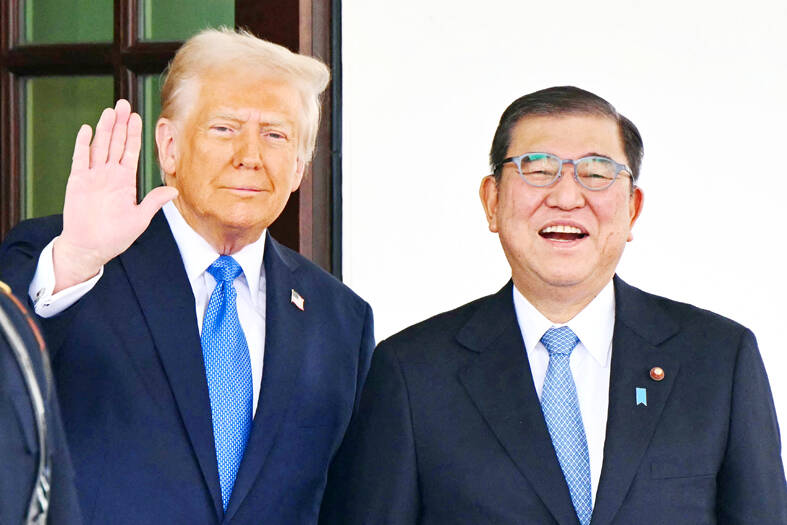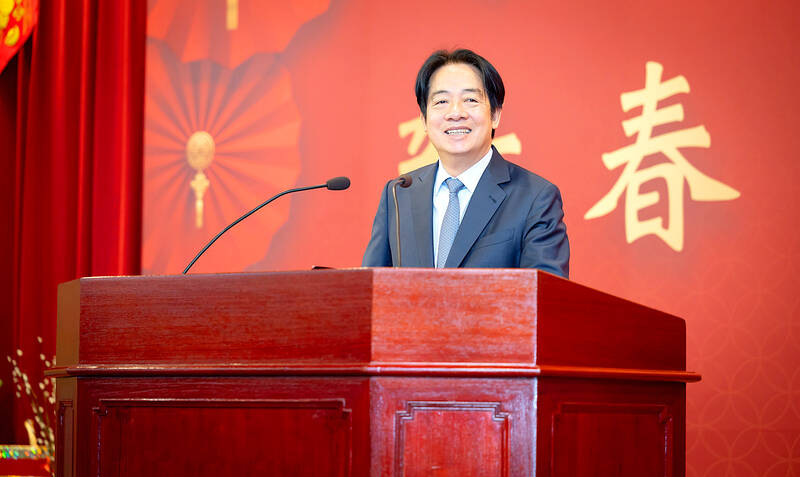US President Donald Trump and Japanese Prime Minister Shigeru Ishiba on Friday reaffirmed the importance of peace and stability in the Taiwan Strait in a joint statement issued after they met in Washington for their first official meeting.
Trump and Ishiba “affirmed their determination to pursue a new golden age for US-Japan relations that upholds a free and open Indo-Pacific and brings peace and prosperity to a violent and disorderly world,” the US-Japan Joint Leaders’ Statement said.
“The two leaders emphasized the importance of maintaining peace and stability across the Taiwan Strait as an indispensable element of security and prosperity for the international community,” it said. “They encouraged the peaceful resolution of cross-strait issues, and opposed any attempts to unilaterally change the status quo by force or coercion.”

Photo: AFP
Trump and Ishiba also expressed support for Taiwan’s meaningful participation in international organizations, it added.
At the meeting, Trump and Ishiba “expressed their determination to continuously cooperate to realize a free and open Indo-Pacific” region, it said.
They “intend to advance multilayered and aligned cooperation among like-minded countries,” including through the Quadrilateral Security Dialogue grouping of the US, Japan, Australia and India, as well as cooperation among Japan, the US and South Korea; Japan, the US and Australia; and Japan, the US and the Philippines, the statement said.

Photo courtesy of the Presidential Office via CNA
Trump and Ishiba reiterated their strong opposition to any attempts by the People’s Republic of China (PRC) to change the “status quo” in the East China Sea by force or coercion.
“The two leaders reaffirmed their strong opposition to the PRC’s unlawful maritime claims, militarization of reclaimed features, and threatening and provocative activities in the South China Sea,” it added.
In Taipei, President William Lai (賴清德) yesterday wrote on X that Taiwan deeply appreciates Trump’s and Ishiba’s “strong support for peace across the Taiwan Strait & Taiwan’s international participation.”
“We will remain steadfast in cooperating with the #US, #Japan & other global partners to advance regional peace & prosperity,” he wrote.
Presidential Office spokeswoman Karen Kuo (郭雅慧) said that the international community agrees that maintaining peace and stability in the Indo-Pacific region is important, and that Taiwan is a responsible member of the international community that is capable and willing to cooperate.
Taiwan would continue to strengthen its self-defense capabilities, deepen partnerships with the US and Japan, and cooperate with like-minded countries to protect the rules-based international order, ensure that the Taiwan Strait and the Indo-Pacific region are free and open, and maintain global peace and prosperity, she said.
Additional reporting by CNA

Conflict with Taiwan could leave China with “massive economic disruption, catastrophic military losses, significant social unrest, and devastating sanctions,” a US think tank said in a report released on Monday. The German Marshall Fund released a report titled If China Attacks Taiwan: The Consequences for China of “Minor Conflict” and “Major War” Scenarios. The report details the “massive” economic, military, social and international costs to China in the event of a minor conflict or major war with Taiwan, estimating that the Chinese People’s Liberation Army (PLA) could sustain losses of more than half of its active-duty ground forces, including 100,000 troops. Understanding Chinese

The Ministry of Foreign Affairs (MOFA) yesterday said it is closely monitoring developments in Venezuela, and would continue to cooperate with democratic allies and work together for regional and global security, stability, and prosperity. The remarks came after the US on Saturday launched a series of airstrikes in Venezuela and kidnapped Venezuelan President Nicolas Maduro, who was later flown to New York along with his wife. The pair face US charges related to drug trafficking and alleged cooperation with gangs designated as terrorist organizations. Maduro has denied the allegations. The ministry said that it is closely monitoring the political and economic situation

‘SLICING METHOD’: In the event of a blockade, the China Coast Guard would intercept Taiwanese ships while its navy would seek to deter foreign intervention China’s military drills around Taiwan this week signaled potential strategies to cut the nation off from energy supplies and foreign military assistance, a US think tank report said. The Chinese People’s Liberation Army (PLA) conducted what it called “Justice Mission 2025” exercises from Monday to Tuesday in five maritime zones and airspace around Taiwan, calling them a warning to “Taiwanese independence” forces. In a report released on Wednesday, the Institute for the Study of War said the exercises effectively simulated blocking shipping routes to major port cities, including Kaohsiung, Keelung and Hualien. Taiwan would be highly vulnerable under such a blockade, because it

UNRELENTING: China attempted cyberattacks on Taiwan’s critical infrastructure 2.63 million times per day last year, up from 1.23 million in 2023, the NSB said China’s cyberarmy has long engaged in cyberattacks against Taiwan’s critical infrastructure, employing diverse and evolving tactics, the National Security Bureau (NSB) said yesterday, adding that cyberattacks on critical energy infrastructure last year increased 10-fold compared with the previous year. The NSB yesterday released a report titled Analysis on China’s Cyber Threats to Taiwan’s Critical Infrastructure in 2025, outlining the number of cyberattacks, major tactics and hacker groups. Taiwan’s national intelligence community identified a large number of cybersecurity incidents last year, the bureau said in a statement. China’s cyberarmy last year launched an average of 2.63 million intrusion attempts per day targeting Taiwan’s critical